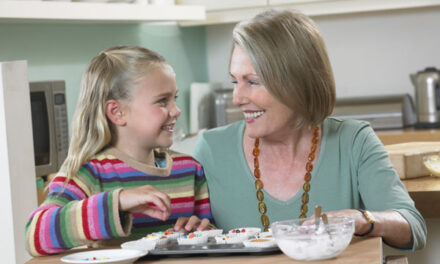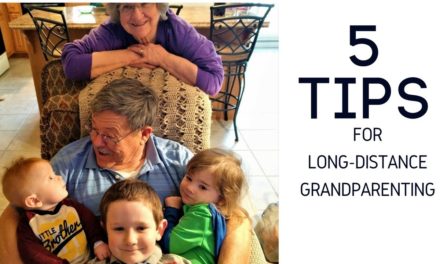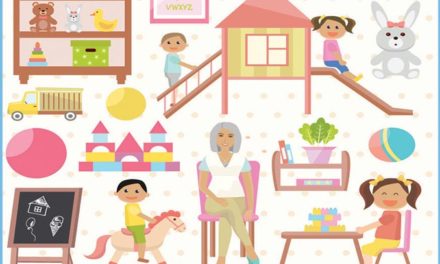How do we want to be known or remembered when we’re gone? Every person is a mixture of good and bad, healthy and unhealthy qualities, and eulogies nearly always end up focusing on a person’s positive traits. As grandparents, we must realize that every day is an opportunity to build a positive heritage, and we can’t afford to remain stuck in a pessimistic or depressing way of life. There may be times to talk about the difficult and dark times of our lives so that family members don’t repeat our mistakes, but even then we can be positive: “Sure, there’s evil in my heritage, but I am working hard to replace it with good.”
Here’s an example of this: A friend of mine, Landon, was abandoned by his father during childhood. As an adult, after thirty years of no contact, Landon heard that his father had passed and decided to attend the funeral. He drove to the service with great trepidation, suppressing his anger and not knowing what to expect.
When Landon entered the auditorium, he picked up a bulletin and learned that his father had remarried and had other children. It was very difficult to sit through the funeral service and listen to his unknown half-siblings speak glowingly about their father—and his. Several times he wanted to jump up and say, “Excuse me, but you’ve got this all wrong. This guy you are talking about was a jerk. He left me and my mom; he never called, never paid child support, never acknowledged my existence. I hope he burns in hell!”
Of course, my friend didn’t do that. He didn’t even get up and storm out of the service. Instead, he gradually settled in, listened to what was being said, and experienced a painful but powerful paradigm shift. He began to realize that the stories and descriptions he heard were also part of his heritage and, perhaps most importantly, he knew he had to deal with the anguish and disgust that had accumulated through the years. He had to forgive and let go. Something supernatural had to occur, because he was now a heritage maker for his children and didn’t want to stay stuck in the abandonment and pain. They deserved better.
The first months were very difficult. He relied heavily on his wife and others for support and encouragement. Through the years that followed, there were ups and downs as he processed various issues, but today he truly feels free. Instead of denying his family heritage, he uses it as motivation to give his own children—and now his first grandchild—something much better, doing and saying things he never saw a father or grandfather do or say.
Like Landon, we can all turn our attention to the coming generations and seek to instill positive character traits—whether they are qualities passed down from family or ones you developed or learned to appreciate in some other way. You have good things to pass on to your children and grandchildren, and that should continue to give you confidence and purpose. What are you uniquely equipped to instill in your grandchildren? What do you want them to remember about you? Focus on attributes, behaviors and virtues that are important to you, and stay positive! Your resiliency will speak volumes and add dignity to your heritage.
As you communicate positive aspects of your heritage to your grandchildren, with stories about receiving positive words of affirmation from those who loved you, let them know clearly that they are part of that heritage as well. This is where the sense of destiny comes in. You want to make affirming deposits into their lives as often as possible, you want to do an even better job as a grandmother or grandfather, and you’re unbelievably excited about them and their future.
Recent comments from one grandmother demonstrate this passion: “I always wondered what kind of grandmother I would be since I never had a grandmother. As I watched my friends pursue other lifestyles and careers, I always wondered why I wasn’t driven like they were. When my first grandbaby was born and I held her close, I realized I was born to be a grandma. It’s what I cherish most in the world. I now have four grandchildren and I treasure every moment with them. I thought I was fierce with my kids, but with my grandkids I am unstoppable. They make me feel like I can do anything.”
We are the architects of our own heritage. The positive words and memories we share will have a lasting impact on our grandchildren and on us as well. Can we do this perfectly? No, but we can do it better. And the aspects of our strong heritage can become solid building blocks for our grandchildren.
Narratives About Heritage
Here are some practical ideas about heritage that flow out of comments we’ve received about grandparents:
Focus on the positive, and discover the ways it has impacted you. “When I was eight, my mother passed away. I had two younger siblings and my mother’s parents took us in. We ended up living in a one-bedroom, one-bath home in Atlanta. Most of us slept on the floor with just a mattress for a bed. Cramped? You bet. But through this experience I knew, by my grandparents’ sacrifice, what love and family meant. They taught us perseverance, stability, tenacity, and of course, love. Today I am a grandmother, proud of my heritage, and want to pass on to my grandchildren the values I have received.”
Begin building your family heritage with pictures, artifacts and mementos you want to pass on. “I was not privileged to know any of my grandparents. This has taught me that heritage is important and I need to make sure my grandchildren have some information. I have been collecting pictures and information, and placing it on a family Facebook page for them and the rest of the family.”
Identify the virtues you want to pass on and model them accordingly. “My grandparents died in 1958 when I was only eleven years old. They lived in a two-room house [and] had little income at that time in their lives, but the happiness and warmth that flowed from their home and lives was evident every day. We ate simple foods, played simple games, talked, laughed, hugged and shared our day together. The heritage they left for me and that I want to leave for my grandkids was not monetary, but strength, character, honesty and a love for God and my fellow man.”
“My grandparents taught me that people could disagree and still be friends. Their love was rarely displayed but ever-present. The great lessons I have carried with me [are]: disagree with humor, recycle everything, and love one another. What a legacy.”
Keep family traditions alive. “My grandmother lost her husband when he turned fifty-one years old—oh, so young. She cherished her children and had family traditions. The favorite was Thanksgiving. All the children and grandchildren would show up and attend church together. After we ate a big dinner with fried green tomatoes, she would read from the Bible. At every meal she would pray, even when we were in public. Guess when she died? It was Thanksgiving Day and we were all together.”




